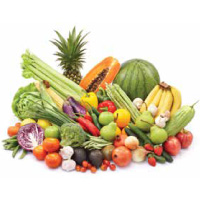According to Oxford Dictionary, superfood is “a nutrient-rich food considered to be especially beneficial for health and well-being”. However, there is actually no standard definition or criteria of superfoods by any authority. Cancer Research UK stated the term ‘superfood’ is a marketing gimmick with little scientific basis to the claim. So, what is the superfood trend about?
Superfoods are introduced by marketers and have been a fad on the internet, with lists of superfoods coming out annually e.g. chia seed, kombucha, quinoa, goji berries, kale, green tea, cocoa, salmon and many more. Food products enriched with certain contents like omega-3, antioxidants or vitamins are also touted as superfoods. Green tea is often advertised to aid in weight loss and prevent cancer, while DHA (a form of omega-3) is claimed to be good for children’s brain development.
Looking at the hype around superfoods, this article examines the truth behind the claims and how we should cultivate a healthy dietary habit instead of just focusing on superfoods.
Are superfoods really ‘super’?
Superfoods do have nutritional contents beneficial to health. Naturally found in oily fish, omega-3 is a type of essential fatty acid important for metabolism, while green tea is high in catechin, an antioxidant that scavenge free radicals harmful to health. Superfood claims are usually accompanied with proof of studies showing high concentration of these substances in the food, or how these substances can prevent or even cure different diseases. But most of these studies are sometimes inconclusive, with mixed findings being reported, and it is unlikely that any single food can have an effect on any disease on its own.
There are some bases in these studies but they usually do not reflect our real diet. Researches show catechin can suppress the growth of cancer cells, but laboratory studies uses purified extract of these beneficial substances from the said food. Moreover, preliminary studies that are tested on animals do not accurately reflect effects in the human body metabolism, with other factors to consider. Some human trials on single plant or animal derivatives, or even multiple combination of derivatives sometimes are poorly designed with small number of subjects, short duration of studies, and a lack of safety data, short term effects that warrant cautious judgement on its use.
Superfoods still can be a part of your family’s diet. However, eating too much of one type of food does not give you all the nutrients you need. The bioactive compounds of cocoa in dark chocolate do have health benefits, but if eaten excessively, it becomes bad due to its high content of sugar and fat, leading to other health problems. A superfood fan with poor dietary habits and lifestyle will not make a difference. Instead of following trends, cultivate a good dietary habit which is key to your health.
Focus on healthy diet
Instead of relying on superfoods, aim for a healthy diet that is Balanced, Moderate, and Varied (BMV) for the family. Achieve a balance in diet by eating more vegetables, fruits and whole grains, and less salt, sugar, fat and oil, according to the recommended intake. Practise moderation, by not eating too much or too little of something. A variety of food in diet is also important to provide different nutrients needed by our body.
One way for your children to have a healthy diet is by encouraging them to eat a variety of fruits and vegetables with different colours. Different colours indicate different pigments e.g. red fruits and veggies like tomatoes are high in lycopene, an antioxidant. Yellow/orange ones like carrots or papaya have beta-carotene, converting to vitamin A. Purple ones like blueberries and beetroots contain anthocyanin, another antioxidant.
Parents should also be conscious of the nutrient content of food products they purchase. Read labels, look for nutrient information panels and food ingredients, and know what you are feeding to your children. Teach children about a healthy diet, and guide them to read labels and ingredients when buying food. Beware of marketing gimmicks, and do not be tricked by attractive packaging and bombastic words.
Your dietary habits have a bigger influence on your health than a couple of superfoods. Superfoods are not harmful but you do not need to rely on it entirely. After all, there is no single food that can provide all the required nutrients for health. It is more practical to practise BMV in your diet based on the Malaysian Food Pyramid every time and everywhere.
Local superfood?
Superfoods that are popular online tend to be pricy and uncommon in Malaysia as the trends start from western countries. However, we also have our local affordable version of superfoods, such as tempeh (rich in protein, fibre, calcium), spinach (vitamin K, calcium, iron), rambutan (fibre, vitamin C), and papaya (vitamin A, folate) and many more.
An educational collaboration with Nutrition Society of Malaysia.







Comments